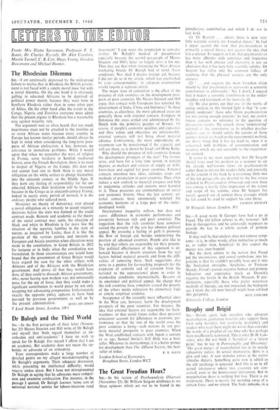The Rhodesian Dilemma
L _1
ER,
.1 L From: Mrs Diana Spearman, Professor P. T Bauer, Dr Charles Rycroft, Dr Alex Comfort. Martin Turnell, C. B. Cox, Hugo Young, Gordon Hausmann and Michael Hunter.
SIR, I am continually depressed by the widespread failure to realise that in Rhodesia the British govern- ment is not faced with a simple moral issue but with a moral dilemma. On the one hand it is obviously galling to educated Africans to be deprived of political power merely because they were born in Southern Rhodesia rather than in some other part of Africa. On the other hand after the events in the Congo, Nigeria and Zanzibar everyone must admit that the present regime in Rhodesia has a reasonable case against majority rule.
The argument now so often heard, that too much importance must not be attached to the troubles of so many African states because every country in Europe has known similar periods, should always be kept in mind when considering the long-term pros- pects of African civilisation; it has, however, no relevance to immediate problems. While I would agree that when we remember the wars of religion in France, some incidents in Scottish mediaeval history, even the French Revolution, there is no need to despair of Nigeria or the Congo, this does not and cannot lead one to think there is any moral obligation on the white settlers to plunge themselves into the sixteenth century or the Middle Ages. If they have any feeling of responsibility for the un- educated Africans their hesitation will be increased because in the Congo as in sixteenth-century France, indeed in nearly every period of turmoil, it is the ordinary people who suffered most.
Moreover no theory of democracy ever placed a moral obligation on a minority to accept majority decisions before the state was formed or the social contract made. Remote and academic as the theory of the social contract may seem, the situation of black and white in Rhodesia is far more like the situation of the separate families in the state of nature, as imagined by Locke, than it is like the position of the various parties and interests in European and Asiatic countries when alterations were made in the constitution, in Great Britain in 1832 for instance or in India when the constitution was formulated. In these circumstances one would have hoped that the government of Great Britain would have argued the case for the white settlers with Africans and of the Africans with the Rhodesian government. And above all that they would have done all they could to dissuade African governments, who, never having seen modern war, not unnaturally press for the use of force, that they could make a significant contribution to world peace by not only accepting but advocating compromise. Unfortunately exactly the opposite policy appears to have been pursued by previous governments as well as by


































 Previous page
Previous page